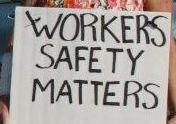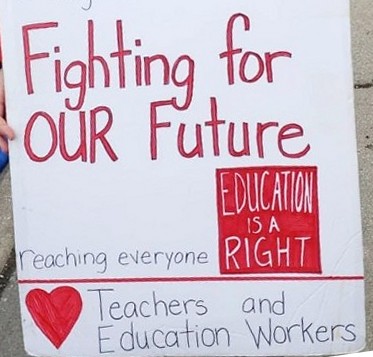March 8, 2021 - No.
14
March
8 - International Women's Day
Call for Women Workers to Lead the
Work for Political Renewal to
Empower the People

Interviews with Women
Who Lead by Example
• Sarah-Jane Shaw,
Steelworker, Operator on Z-line at Stelco in Hamilton
• Shannon
Horner, Steelworker in Ontario.
• Geneviève
Royer, High School Remedial Teacher
• Marjolaine
Aubé, President
of the Union of Workers at the Integrated Health and Social Services
Centre of Laval (CISSS de Laval-CSN)
• Anne-Marie
Taylor, Receiver/Tank Farm Operator, Calgary International Airport
• Kathleen
Mpulubusi, Edmonton Letter Carrier
• Laura Chesnik, Elementary Teacher, Co-Host of Education Is A Right and MLPC Candidate in Windsor, Ontario
March 8 --
International Women's Day

March 8, 2020. International Women's
Day, Montreal
|
|
The Communist Party of Canada
(Marxist-Leninist) greets March 8, International Women's Day, with full
confidence that women workers will continue to take the lead in the
work to renew the political process and the society, which require the
people's empowerment. Communist women have proven in this period, as in
the past, that they take up the question of gender discrimination as a
question of emancipating the working class. The mobilization of women
workers for the renewal of the political process is a step in this
direction. The present period is one of retreat of
revolution which is witnessing a brutal anti-social offensive,
nation-wrecking and the pursuit of an agenda of aggression and war on
the part of governments and the imperialist interests which dominate
them. Far from losing its leading role, it is the working class which
has to provide an alternative to the retrogression which is being
imposed on the society. Women workers are playing a crucial role in
this, first and foremost, by ensuring that they do not get diverted or
dissipate their energies on issues which do not put them at the
centre-stage of the developments. They must, as is the case with all
the workers, be political, work out their program, and take the same to
all sections of the society. International
Women's Day is a fitting occasion this year in the midst of the
COVID-19 pandemic for women workers to pledge their adherence to the
cause of their own emancipation which is linked to the emancipation of
the entire working class. In the course of the developments which have
been taking place, women with positions of power and privilege have
declared they will protect women, but they do not shed a tear over the
plight of women workers at home and the world over who bear the brunt
of the attacks which are taking place so as to make the rich richer.
None has pointed out that reforms are needed to improve their working
and living conditions, and not to make them even worse. The
imposition of what are called liberal-democratic institutions on
countries whose resources the imperialists covet has increased their
enslavement. Women workers do not entrust others to represent their
concerns because it is a waste of their energies. On
the contrary, they have been raising their own demands, speaking in
their own name and fighting for their rights within the context of
fighting for the rights of all. Only in this way can all women be
emancipated. Advanced women workers should join the Party, organize
basic organizations for the emancipation of women at the workplace,
inclusive of all fellow workers, irrespective of gender, and excel in
taking up political affairs under the banner of the democratic renewal
of the political process. CPC(M-L) takes this
opportunity to express its full support for all women fighting for
emancipation on the world scale and to hail the increasing
participation of women in political affairs. The Party condemns all
racist attacks and acts of police impunity and other acts of oppression
and humiliation of women, condemns kidnappings and rape and other forms
of brutality and terror practised by the ruling circles against them,
demands the release of all those imprisoned as a result of their
political actions, and demands that all those committing crimes against
women be punished. With optimism and confidence in
the abilities of communist women and all fighting women workers, we
send women everywhere our militant greetings and regards. 
Interviews
with Women Who Lead by Example

We are still fighting for equality in the workplace in terms
of
being given opportunities that men are given. There is still a
perception that women can't do jobs that men can do and so we are still
fighting that. Stelco is a predominantly male workforce with women in
the minority and we are still treated differently and not given the
opportunities that men are given. Things are getting better but we are
not where we need to be yet. We have about 500 production workers here
now and only about 40 are women. I have personal
experience in this fight. The company trained men
who were junior to me for jobs that I wanted to be trained for. They
could do that because we are all paid the same rate, so they can pick
and choose. We fought, filed grievances and won and I got the training
but that still goes on. It wasn't until the grievances were filed that
I was allowed to train on jobs. My union, local
1005, is excellent at giving women training opportunities if they
choose to do so. Generally, in industry, women are
intimidated to even apply to some
industrial workplaces because of the history of what has gone on in the
past. And it is not for everyone. I have friends who I know would not
fit into that environment because it is predominantly male, catered
more to men than women because there are so few of us. One
example is our change house. It is greatly in need of upgrading. It was
originally for men and was condemned years ago but that's now the
change house for the women. It is a dilapidated facility. They have
supposedly ordered a new change house which was to be commissioned last
fall but we haven't seen it yet. As women in a
predominantly male work force we have come a long way
based on our own work ethics but I believe we still have a long way to
go. Some of the women at Stelco have been very involved in the fight
against Stelco's bankruptcy and all the battles over the years and are
active in the union and all the battles that 1005 has
fought. I am hopeful that the future holds change
and better opportunities
for those starting now. I have 21 years seniority and I want things to
be better for the new women based on all the work we have been doing.

For women workers in the steel industry and all heavy
industry,
health and safety is one of the main concerns. It's a male dominated
environment and sometimes it is not up to the times in terms of the
inclusion of women workers in health and safety plans. We are working
towards solutions but it's a slow moving train. I think that women
provide great value, are an incredible asset in industrial settings. We
bring different viewpoints to this kind of industry and provide good
role models for our daughters and our sisters.  One
of the things that concerns women workers is humanizing the industry
and the world. We have some different perspectives, bring what are
called soft skills, to the industry. I'm not saying men don't have soft
skills but women do focus more on issues like mental health. The steel
industry is not known for being a very nurturing industry
but the world needs change, needs humanizing. One
of the things that concerns women workers is humanizing the industry
and the world. We have some different perspectives, bring what are
called soft skills, to the industry. I'm not saying men don't have soft
skills but women do focus more on issues like mental health. The steel
industry is not known for being a very nurturing industry
but the world needs change, needs humanizing.
Health
and safety in industrial settings is complex and there are
problems. Health includes mental, emotional and physical; you have to
be healthy in all three to be productive and safe. Historically mental
and emotional health has not been given high priority. The world is
changing and we need to make changes and look at people holistically.
Mental health has to be a priority globally. Women are playing an
active role in helping humanity evolve, in humanizing society.
I look at the example of how health care workers, who are
mostly
women, are under-valued although they play a vital role. I am a single
mom with four kids including one with complex special needs and I know
the value of the health care workers that we turn to in times of
crisis, like the pandemic. I think the human spirit is resilient and
together we can envision change in the world and bring it about.

In Quebec, with the pandemic, we face even greater needs in
the education
system to ensure the health and safety of students and staff and also
to create a feeling of safety and confidence among students who face
even greater learning difficulties and delays in the chaotic situation
that exists in education. We must intervene on the spot, collectively,
and
not as individuals in front of management, to correct the problems that
arise. We must act more quickly than before, on a daily basis. More
than ever, the demands we have been making for years, such as reducing
class sizes and improving services for students with difficulties, are
necessary to stabilize the situation, but they are still being
ignored.  We
have to do all of this in the midst of negotiations for the renewal of
our collective agreements. We face continued state restructuring of the
education system to serve private interests, and this restructuring
deprives teachers of a voice in determining working conditions. With
the pandemic, governance by decree has been strengthened. At the
tables, negotiators representing the government still tell us that they
have no mandate to negotiate on the basis of our demands, and this
after 67 negotiation meetings. We
have to do all of this in the midst of negotiations for the renewal of
our collective agreements. We face continued state restructuring of the
education system to serve private interests, and this restructuring
deprives teachers of a voice in determining working conditions. With
the pandemic, governance by decree has been strengthened. At the
tables, negotiators representing the government still tell us that they
have no mandate to negotiate on the basis of our demands, and this
after 67 negotiation meetings.
The teachers are
discussing our situation passionately at the moment
because we can see that we need to re-examine and re-think the
traditional forms of the state-led bargaining, such as
conciliation-mediation, followed by reports, then strike mandate votes,
and after that strike notices, etc. The pandemic itself is forcing us
to re-think these
things. We are discussing how to hold discussions and actions among the
public to mobilize public opinion and hold the government accountable
for its rejection of our demands, when we are in the best position to
know what arrangements are needed to deal with the crisis in education,
a crisis that is aggravated by the pandemic. Our voice must
become influential in decision-making on matters that concern us and
that are important to the education system and the well-being and
future of youth. Women make up 76 per cent of the
teaching staff in primary and
secondary schools, and they are most active in all aspects of the
struggle, including the current discussion on how to move forward under
the conditions of the public health crisis. 
In the health network, more than three-quarters of employees
are
women. We're the ones holding up the health care system against all
odds. We treat our patients like our families, but we want to be
treated properly too. Just in terms of wages, there hasn't been
progress in about 20 years. We are not even keeping up with the cost of
living.
Women make up the majority of low wage earners in the health care
system. Yet, working in the health care system requires devotion. You
really have to take it to heart. If you take my CISSS, we cover all
aspects of the health network, called missions.  We
take care of everyone from the time one is in the mother's womb to the
end of their lives.
We work in the family-child/youth mission, the hospital mission, the
youth center mission, the mission for autistic patients with the
rehabilitation centre for people with intellectual disabilities (CRDI),
the rehabilitation mission with the Jewish Rehabilitation Hospital, the
residential and long-term care centres (CHSLDs), the local community
service centres and all the home care services, and more. All segments
of society are represented and it is mostly women who take care of them. We
take care of everyone from the time one is in the mother's womb to the
end of their lives.
We work in the family-child/youth mission, the hospital mission, the
youth center mission, the mission for autistic patients with the
rehabilitation centre for people with intellectual disabilities (CRDI),
the rehabilitation mission with the Jewish Rehabilitation Hospital, the
residential and long-term care centres (CHSLDs), the local community
service centres and all the home care services, and more. All segments
of society are represented and it is mostly women who take care of them.
I think that what we do is no longer valued. When I started in
the
network 34 years ago, my position was respected. Everyone envied me. I
had a good wage and good working conditions. In all these years, I have
not even had a ten dollar raise. I look at my co-workers and so many of
them are single mothers. I myself raised two children
without alimony, only with one single wage. We have
to start recognizing women's work, give them good
conditions, a good wage so that we can continue to take care of all the
people who are part of the population and who are like members of our
family. 
The airport is like a ghost town. Our aviation fueling area
of the
airport is run by a consortium of the major airlines and some of the
cargo haulers. It controls the facilities and all the equipment. We are
responsible for fueling all the planes, driving trucks, working in the
office and in a below surface area called the tank farm. In
spite of the fact that these big companies are responsible for
the operation and maintenance of the facilities, we as individual
workers took on the issue of safety during the pandemic. I don't let
any safety issues slide. I am a member of the Teamsters Union and was
active in my union in the telecommunications industry. Behind
the scenes the consortium is calling the shots and there are constant
attempts to erode our working conditions.  Health
and safety conditions have been nonexistent until very recently. Our
most vigilant employees have been women. Right from the beginning, a
woman part-time employee at the tank farm set an example by wearing a
mask. I brought in cleaning supplies and disinfected every possible
surface. On our own some of us started wearing masks,
but neither our company, nor the consortium, nor the government at that
point made mask wearing mandatory. As the pandemic progressed,
parents of some of our co-workers died from COVID-19, and later on some
of our co-workers and their spouses contacted COVID-19. At that point
some safety procedures, some of which were not practical within our
workspace, were
brought in, and still no mask mandate. Health
and safety conditions have been nonexistent until very recently. Our
most vigilant employees have been women. Right from the beginning, a
woman part-time employee at the tank farm set an example by wearing a
mask. I brought in cleaning supplies and disinfected every possible
surface. On our own some of us started wearing masks,
but neither our company, nor the consortium, nor the government at that
point made mask wearing mandatory. As the pandemic progressed,
parents of some of our co-workers died from COVID-19, and later on some
of our co-workers and their spouses contacted COVID-19. At that point
some safety procedures, some of which were not practical within our
workspace, were
brought in, and still no mask mandate.
We have
contact with each other and other airport employees and with
the truck drivers delivering fuel. Hundreds of truckers lost their
jobs, and those still working deserve to be safe. I alerted all the
truckers that I could when we had a tank farm worker who tested
positive, so they could take precautions. I encouraged my co-workers to
do the
same. Every trucker was told until the employee who had COVID came back
to work. That was at the time of the first case we had. Again, no
responsibility was taken by our employer or the consortium! Finally
some safety procedures were put in place. It has
only been in the last few weeks that a safety audit regarding
COVID-19 has been put in place. Training courses have taken place on
safety but in confined spaces, well into the pandemic, where the
contract trainer was not even wearing a mask. Those of us who realize
the necessity continue to lead by example, and will continue
to do so. What has also been helpful is the example
set by Air Canada workers,
who always follow the safety protocols. We interact with them on the
tarmac and I am pretty sure that they helped to get the consortium to
finally enforce stricter measures in our area. It shows how we all have
to work together and stand up for each others' rights. 
I work as a letter carrier, so I am speaking mainly about
what
happened in my depot. When the pandemic first hit, Canada Post (CPC)
wasn't really taking it seriously. The union called for masks and
social distancing from the beginning. Initially masking wasn't a huge
issue, it was about getting things clean. Handling mail is a dirty job,
there is so much paper dust, and our workplaces are filthy, never
properly cleaned. The union demanded hand sanitizer and disinfectant at
every work station, proper cleaning supplies, masks, gloves and a
protocol for sanitizing our vehicles. CPC understood we would exercise
our right to refuse unsafe work if necessary, as we have done before.
Canada Post also agreed to our request to hire additional cleaners to
come in during the day.  I
am a member of the depot health and safety committee. We spent a lot of
time talking to our fellow workers about what we should be doing. Our
facilities are quite crowded, particularly in the morning. The union
proposed splitting up the working groups from two start times to four,
with no overlap between shifts. We settled on a checkerboard
arrangement so that when working at your case, you would not have
anyone beside you or behind you. I
am a member of the depot health and safety committee. We spent a lot of
time talking to our fellow workers about what we should be doing. Our
facilities are quite crowded, particularly in the morning. The union
proposed splitting up the working groups from two start times to four,
with no overlap between shifts. We settled on a checkerboard
arrangement so that when working at your case, you would not have
anyone beside you or behind you.
In the plant,
there were a lot more issues with cleaning and social
distancing so measures included staggering coffee and lunch
breaks,
spacing people out in the equipment, and cleaning. Masks were not
mandatory until August or September. We did have some shutdowns,
especially in the plant, where they would bring in specialized cleaning
crews, clean the plant and then send everyone back to work. But overall
in Edmonton we have been relatively spared, compared, for example, to
Toronto where they have very large outbreaks and a worker died.
The key factor in keeping us safe has been our local getting
very
proactive right from the beginning and forcing Canada Post to get
serious about adopting protocols. Canada Post was looking at the dollar
signs, and were not prepared to pay out to provide what we needed. For
the future, we have shown the value of keeping our workplaces
clean. The air is better, there is not as much dust. I
have been involved twice in my depot where we have organized a
mass right to refuse unsafe work, and our local management knew we
could do it
again if needed. We have invoked this right over forced overtime, and
also when Canada Post brought in a new double bundle delivery method
where we were expected to sort mail while walking our route
to reduce sortation time at the depot, lengthen the routes, and cut
staff. 
For our own mental health we need to make our No actually be No!
The decision of the Ford government to postpone March Break from
March 15-19 to April 12-16 in Ontario was one more in a series of
government decrees with which educators are being hit over the head day
after day. There is no predicting what the government will do, as they
refuse to involve the people concerned at any level. This trickles down
into our schools as schedules, classes and routines are all upended
from one day to the next. You cannot plan or predict -- as an
individual or as a teacher or education worker or as a parent with kids
-- when this is the situation. It leads to immense stress for us and
the kids, and then makes our stress even more intense because we are
worrying about our students. A lot of people are taking stress leaves
as a result of having physical symptoms caused by this situation.
 The government's main argument for the postponement of March Break
was to "limit opportunities for congregation." They alleged that
congregation outside the school is what has caused previous spikes in
COVID-19 cases in school-aged children. But where are the basic public
health measures such as guaranteeing proper ventilation and mass
testing -- not this targeted "wherever we decide" testing, but mass
readily available testing? Where are minimum standards for distancing
in schools? Where are the paid sick days so families can readily comply
when they need to stay home when they or their children are
symptomatic? Without providing these conditions, for the government to
claim moving March Break was to keep COVID-19 out of our schools is
disingenuous to say the least and, in my view, criminal when one
considers that they are blaming the students and their families for the
spike in cases instead of taking up their duties to the people. The government's main argument for the postponement of March Break
was to "limit opportunities for congregation." They alleged that
congregation outside the school is what has caused previous spikes in
COVID-19 cases in school-aged children. But where are the basic public
health measures such as guaranteeing proper ventilation and mass
testing -- not this targeted "wherever we decide" testing, but mass
readily available testing? Where are minimum standards for distancing
in schools? Where are the paid sick days so families can readily comply
when they need to stay home when they or their children are
symptomatic? Without providing these conditions, for the government to
claim moving March Break was to keep COVID-19 out of our schools is
disingenuous to say the least and, in my view, criminal when one
considers that they are blaming the students and their families for the
spike in cases instead of taking up their duties to the people.
Obviously, cancelling March break contributes to our stress as the
break would have been a chance to stop and think. Parents are also at
the mercy of decisions made without them, such as being forced to
choose, at the height of the second wave, which learning model
(face-to-face or virtual or paper packages) their children would
participate in
for the rest of the year. You can guess that many additional families
chose virtual, which then led to classes being reorganized, students
changing classes, bringing in new teachers and staff, etc...
In the face of all this, we are not going to let ourselves be
victims of this virus or of our government's criminal indifference to
our health and safety, including our mental health. There is no end in
sight if we rely on the government or just reduce ourselves to
complaining about how bad they are and waiting for an election. No
means No!
Educators are making demands for changes in our working conditions in
our schools, such as proper PPE including N95 masks, proper testing,
proper ventilation in each of our rooms not just the school as a whole.
So far, we are being told that the school "meets or exceeds standards"
without answering our specific questions so that we can have
peace of mind or take measures.
Where demands are not being met or are out of the control of the
school or the school board, refusing to accept what is unacceptable is
more and more becoming a way to affirm our humanity. In this respect
the starting point is our right to refuse to go along with things which
are clearly unsafe. It is a matter of affirming our right to freedom of
speech and conscience to take a stand for our own health and safety
which upholds the rights of all to health and safety. As things move
forward I think more and more teachers and education workers will find
ways to say No! under these difficult circumstances. Taking sick leaves
and doing some breathing exercises are not solving the problem. We are
protecting our own mental health by taking up our social responsibility
to make our No mean No!

(To access articles individually
click on the black headline.)
PDF
PREVIOUS
ISSUES | HOME
Website:
www.cpcml.ca
Email: office@cpcml.ca | 



 We
have to do all of this in the midst of negotiations for the renewal of
our collective agreements. We face continued state restructuring of the
education system to serve private interests, and this restructuring
deprives teachers of a voice in determining working conditions. With
the pandemic, governance by decree has been strengthened. At the
tables, negotiators representing the government still tell us that they
have no mandate to negotiate on the basis of our demands, and this
after 67 negotiation meetings.
We
have to do all of this in the midst of negotiations for the renewal of
our collective agreements. We face continued state restructuring of the
education system to serve private interests, and this restructuring
deprives teachers of a voice in determining working conditions. With
the pandemic, governance by decree has been strengthened. At the
tables, negotiators representing the government still tell us that they
have no mandate to negotiate on the basis of our demands, and this
after 67 negotiation meetings. We
take care of everyone from the time one is in the mother's womb to the
end of their lives.
We work in the family-child/youth mission, the hospital mission, the
youth center mission, the mission for autistic patients with the
rehabilitation centre for people with intellectual disabilities (CRDI),
the rehabilitation mission with the Jewish Rehabilitation Hospital, the
residential and long-term care centres (CHSLDs), the local community
service centres and all the home care services, and more. All segments
of society are represented and it is mostly women who take care of them.
We
take care of everyone from the time one is in the mother's womb to the
end of their lives.
We work in the family-child/youth mission, the hospital mission, the
youth center mission, the mission for autistic patients with the
rehabilitation centre for people with intellectual disabilities (CRDI),
the rehabilitation mission with the Jewish Rehabilitation Hospital, the
residential and long-term care centres (CHSLDs), the local community
service centres and all the home care services, and more. All segments
of society are represented and it is mostly women who take care of them. Health
and safety conditions have been nonexistent until very recently. Our
most vigilant employees have been women. Right from the beginning, a
woman part-time employee at the tank farm set an example by wearing a
mask. I brought in cleaning supplies and disinfected every possible
surface. On our own some of us started wearing masks,
but neither our company, nor the consortium, nor the government at that
point made mask wearing mandatory. As the pandemic progressed,
parents of some of our co-workers died from COVID-19, and later on some
of our co-workers and their spouses contacted COVID-19. At that point
some safety procedures, some of which were not practical within our
workspace, were
brought in, and still no mask mandate.
Health
and safety conditions have been nonexistent until very recently. Our
most vigilant employees have been women. Right from the beginning, a
woman part-time employee at the tank farm set an example by wearing a
mask. I brought in cleaning supplies and disinfected every possible
surface. On our own some of us started wearing masks,
but neither our company, nor the consortium, nor the government at that
point made mask wearing mandatory. As the pandemic progressed,
parents of some of our co-workers died from COVID-19, and later on some
of our co-workers and their spouses contacted COVID-19. At that point
some safety procedures, some of which were not practical within our
workspace, were
brought in, and still no mask mandate. The government's main argument for the postponement of March Break
was to "limit opportunities for congregation." They alleged that
congregation outside the school is what has caused previous spikes in
COVID-19 cases in school-aged children. But where are the basic public
health measures such as guaranteeing proper ventilation and mass
testing -- not this targeted "wherever we decide" testing, but mass
readily available testing? Where are minimum standards for distancing
in schools? Where are the paid sick days so families can readily comply
when they need to stay home when they or their children are
symptomatic? Without providing these conditions, for the government to
claim moving March Break was to keep COVID-19 out of our schools is
disingenuous to say the least and, in my view, criminal when one
considers that they are blaming the students and their families for the
spike in cases instead of taking up their duties to the people.
The government's main argument for the postponement of March Break
was to "limit opportunities for congregation." They alleged that
congregation outside the school is what has caused previous spikes in
COVID-19 cases in school-aged children. But where are the basic public
health measures such as guaranteeing proper ventilation and mass
testing -- not this targeted "wherever we decide" testing, but mass
readily available testing? Where are minimum standards for distancing
in schools? Where are the paid sick days so families can readily comply
when they need to stay home when they or their children are
symptomatic? Without providing these conditions, for the government to
claim moving March Break was to keep COVID-19 out of our schools is
disingenuous to say the least and, in my view, criminal when one
considers that they are blaming the students and their families for the
spike in cases instead of taking up their duties to the people.